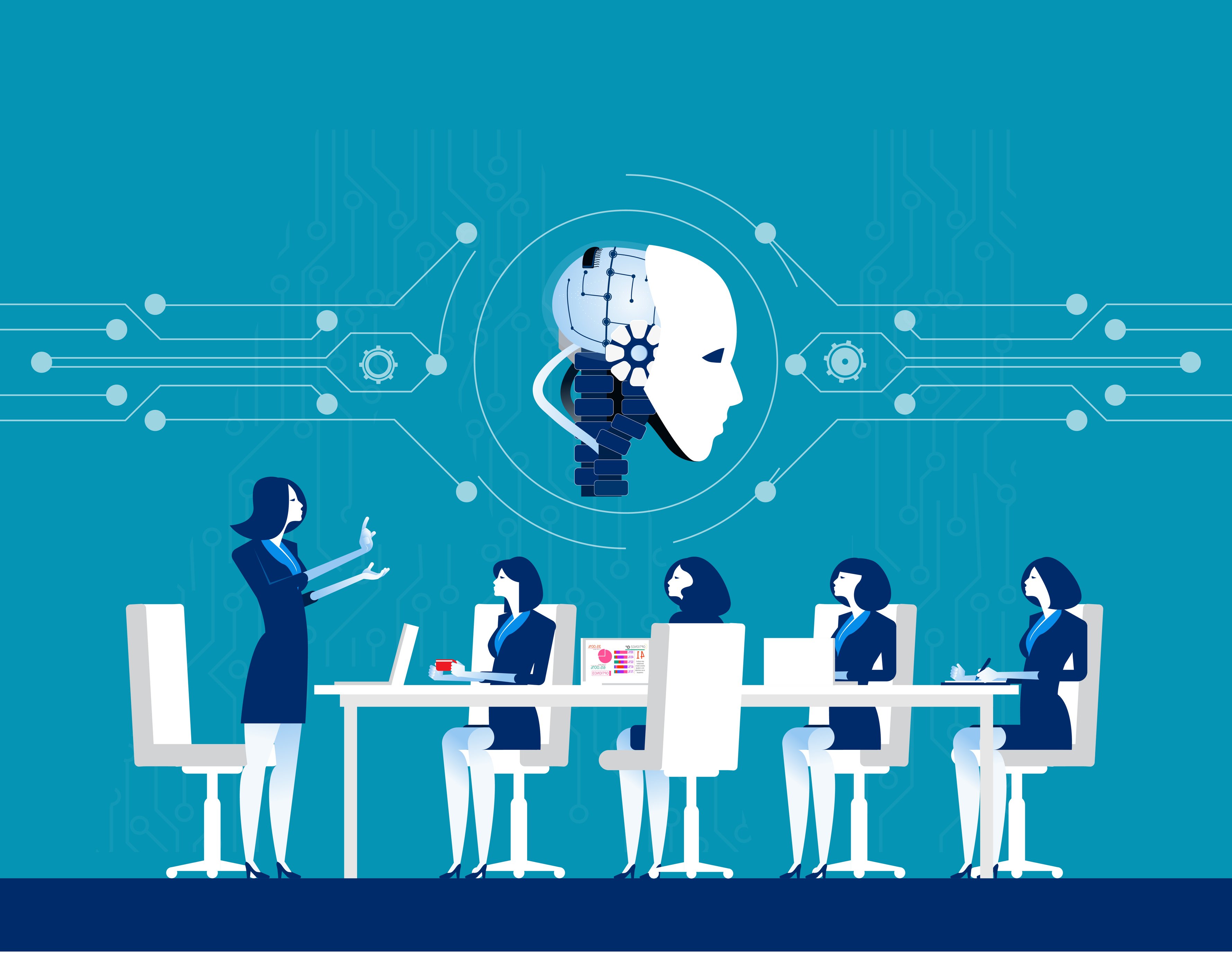May 21, 2019
 by Rebecca Reynoso / May 21, 2019
by Rebecca Reynoso / May 21, 2019

Enterprise businesses (you know, multi-million dollar companies that don’t need any more name recognition) utilize artificial intelligence to automate certain day-to-day processes in order to boost their bottom line.
But do small businesses use AI as well? Absolutely.
You might not think that small businesses need to use artificial intelligence in the same way that enterprise companies do, but AI automation isn’t just for large companies. AI is used in many facets of business success, from data sorting, email marketing, and much more.
Small businesses, or those with fewer than 1500 employees, need AI almost more than enterprise companies do. Why? Well, consider this: a company with fewer employees has more responsibilities that have to be shared by a smaller number of people. This can make even the simplest tasks seem overwhelming.
If you have a few hundred customers, but an office staff of only 45 employees, and the task of data mining customer information is the responsibility of one individual – imagine how much longer that task will take one person as opposed to the amount of time it would take a machine learning algorithm fueled by AI.
Because of this, a larger number of small businesses are dabbling in AI automation. Artificial intelligence automation brings a wealth of opportunity to businesses that are seeking advancements in speed, accuracy, and overall workflow.
Keep reading for seven expert tips on how small businesses are using AI automation in 2019!
“We rely on a number of automated tools, but the one that probably saves us the most time is an expense management tool called Itemize. It's an automated solution that allows me and my staff to easily track and record expenses. Everything from travel, client entertainment, or purchasing something for a client – it's all automated.
We simply take a picture of the receipt from our phone and it's automatically put into the Itemize app, which is then stored and provided to accounts payable for reimbursement. Itemize eliminates human error, not to mention all the tedious time-consuming expense reports, which are now a thing of the past. I can review and approve in minutes, and come tax time, everything is already in the database. Saves each staffer probably five or more hours a week, and that means we're more productive.”
- Rodger Roeser, CEO at The Eisen Agency
“At Spire Digital, we use artificial intelligence to create contact lists for our clients as well as our own email campaigns.
To do this, we use an AI software called Seamless.ai, which searches through Twitter, Facebook, and LinkedIn to accumulate a list of contacts. It pulls the data for us rather than having a person scour the internet trying to find contact information at a much slower pace with less accuracy.
What’s great about Seamless.ai is that it allows us to segment the lists of data by industry, company size, revenue, job title, and more to help with our email marketing strategy!”
- Nicholas Farmen, Marketing Coordinator at Spire Digital
“We use AI chatbots for an initial filter to vet out prospective clients before they are connected to an account representative. People enjoy a combination of automation and personal connection.
Our CRM tool implements AI in order to tell us what prospects to reach out to and when. This eliminates dead-end leads and optimizes everyone's time while improving profitability. The power of optimizing your CRM is crucial to have solid processes and workflow around customer support, and AI is huge in making this possible.”
- Jared Weitz, CEO and Founder at United Capital Source, Inc.
“At Curation Zone, we have designed a technology which uses AI to help marketers and creative agencies find filmmakers and social media influencers. We’re huge advocates of the idea that AI and tech are enablers for the creative industry rather than a destroyer, as many critics believe.
Curation Zone uses machine learning (ML) to scour every corner of the web (websites and social media channels) to locate and analyze videographers and influencers. It then categorizes their expertise, identifies any awards to their name, specifies how much engagement they’ve had with previous videos – and even which brands they’ve worked with before. It then filters down the search as the user adds search specifications such as ‘short form expert,’ ‘fashion specialist,’ and so on, bringing a list of one million filmmakers to around 10 for the client to choose from.
So, it’s like TripAdvisor, but it analyzes creative people across the web instead of hotels. Tech like this has been used in certain areas of the recruitment industry before, but never for the creative sector – and never for video.”
- Russell Glenister, CEO and Founder of Curation Zone
“At ZipBooks, even though we’re a startup, we quickly opted to integrate machine learning in order to keep up with big name competitors. The repetitive nature of bookkeeping means that our data lends itself well to pattern observation. As ZipBookers enter transactions, our software automatically categorizes it based off of historical trends. The more you categorize, the smarter our ML software becomes, meaning your bookkeeping becomes more efficient and automated.
Additionally, we use data-driven intelligence to help users improve their invoicing processes and business health. We provide smart scores based on accounting best practices. This allows ZipBookers to see what’s working and what’s not, and then use our observations to improve their processes.”
- Rachel Cottam, Marketing Manager at ZipBooks
“We use artificial intelligence to recommend the best travel insurance plan to our customers based on specific trip details. When a customer inputs their age, destination, trip cost, and travel dates for a quote, we show them the optimal plan for that trip.
We use stats such as average medical cost of the destination, chances of delays or cancellations based on weather, crime rates, and the need for benefits like medical evacuation depending on the availability of quality medical care in that specific area. With that information, we recommend a plan that will best suit and protect you.
Additionally, we use artificial intelligence for an improved claims experience. With AI, our ability to speed up the claims process in both reviewing our customers’ eligibility for a claim and detecting fraudulent claims has drastically increased. This results in a smoother claims process for the customer and allows them to receive their compensation quicker than ever before.”
- Zeshan Jeewanjee, CMO of G1G Travel Insurance
“At Homebase, we use artificial intelligence to automate some of our back office tasks – specifically scheduling our customer success team, which is housed in Houston.
The Homebase team scheduling app takes the following things into account: roles (we have three specialized customer success teams), availability, overall labor costs, and seniority in order to automatically build the weekly schedule. After the schedule is built, we then review it, make any necessary changes, and publish it – all in just a few minutes.”
- Ravi Dehar, Head of Growth at Homebase
As businesses push forward with technological advancements, it’s time your small business does as well. You wouldn’t want a potential customer or client to choose a competitor over you, and the difference could really be as small as how you or they approach using AI automation to maintain a business presence.
Choose from the highest-rated artificial intelligence software today to get started!
Rebecca Reynoso is the former Sr. Editor and Guest Post Program Manager at G2. She holds two degrees in English, a BA from the University of Illinois-Chicago and an MA from DePaul University. Prior to working in tech, Rebecca taught English composition at a few colleges and universities in Chicago. Outside of G2, Rebecca freelance edits sales blogs and writes tech content. She has been editing professionally since 2013 and is a member of the American Copy Editors Society (ACES).
Behind any successful company are the career-changing decisions that helped make them great....
 by Lauren Pope
by Lauren Pope
Imagine you accidentally leave a rarely-used window open in your home. You don’t think...
 by Soundarya Jayaraman
by Soundarya Jayaraman
In a digital-first world, where customer expectations continue to rise, more and more...
 by Erika Madriñan
by Erika Madriñan
Behind any successful company are the career-changing decisions that helped make them great....
 by Lauren Pope
by Lauren Pope
Imagine you accidentally leave a rarely-used window open in your home. You don’t think...
 by Soundarya Jayaraman
by Soundarya Jayaraman


